Top Rankings
Woodland Joint Unified School District ranks among the top 20% of public school district in California for:
Category
Attribute
Community Size
Largest student body (number of students) (Top 1%)
For the 2025 school year, there is 1 public charter school serving 224 students in Woodland Joint Unified School District. This district's average charter testing ranking is 7/10, which is in the top 50% of public charter schools in California.
Public Charter School in Woodland Joint Unified School District have an average math proficiency score of 37% (versus the California public charter school average of 31%), and reading proficiency score of 47% (versus the 48% statewide average).
Minority enrollment is 71% of the student body (majority Hispanic), which is less than the California public charter school average of 75% (majority Hispanic).
Overview
This School District
This State (CA)
# Schools
17 Schools
1,300 Schools
# Students
9,446 Students
711,386 Students
# Teachers
433 Teachers
31,394 Teachers
Student : Teacher Ratio
22:1
22:1
District Rank
Woodland Joint Unified School District, which is ranked #1142 of all 1,925 school districts in California (based off of combined math and reading proficiency testing data) for the 2021-2022 school year.
The school district's graduation rate of 91% has increased from 88% over five school years.
Overall District Rank
#1148 out of 1941 school districts
(Bottom 50%)
(Bottom 50%)
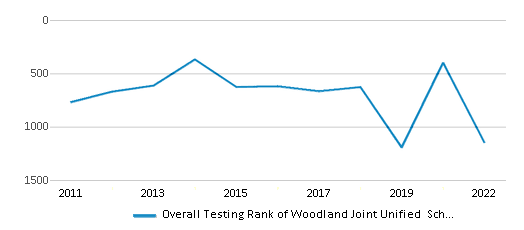
Math Test Scores (% Proficient)
24%
33%
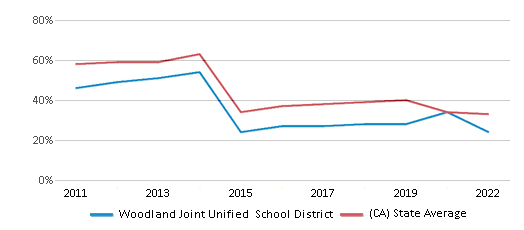
Reading/Language Arts Test Scores (% Proficient)
37%
47%
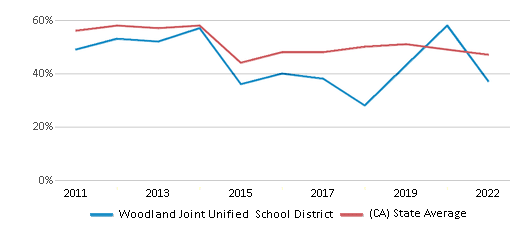
Science Test Scores (% Proficient)
20%
29%
Graduation Rate
91%
87%
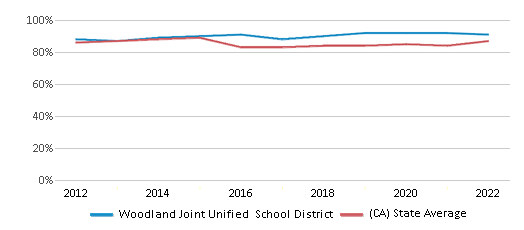
Students by Ethnicity:
Diversity Score
0.49
0.65
# American Indian Students
35 Students
3,137 Students
% American Indian Students
n/a
1%
# Asian Students
648 Students
49,250 Students
% Asian Students
7%
7%
# Hispanic Students
6,512 Students
378,755 Students
% Hispanic Students
69%
53%
# Black Students
145 Students
48,500 Students
% Black Students
1%
7%
# White Students
1,571 Students
176,738 Students
% White Students
17%
25%
# Hawaiian Students
54 Students
2,385 Students
% Hawaiian Students
1%
n/a
# Two or more races Students
467 Students
48,230 Students
% of Two or more races Students
5%
7%
Students by Grade:
# Students in PK Grade:
-
83
# Students in K Grade:
906
60,517
# Students in 1st Grade:
710
46,070
# Students in 2nd Grade:
700
47,155
# Students in 3rd Grade:
689
46,520
# Students in 4th Grade:
690
46,583
# Students in 5th Grade:
720
46,919
# Students in 6th Grade:
677
54,274
# Students in 7th Grade:
694
57,837
# Students in 8th Grade:
710
57,970
# Students in 9th Grade:
734
70,272
# Students in 10th Grade:
707
64,790
# Students in 11th Grade:
710
57,670
# Students in 12th Grade:
799
54,726
# Ungraded Students:
-
-
District Revenue and Spending
The revenue/student of $15,802 in this school district is less than the state median of $19,974. The school district revenue/student has stayed relatively flat over four school years.
The school district's spending/student of $13,734 is less than the state median of $18,396. The school district spending/student has stayed relatively flat over four school years.
Total Revenue
$149 MM
$116,387 MM
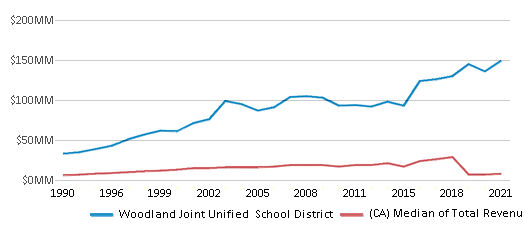
Spending
$130 MM
$107,188 MM
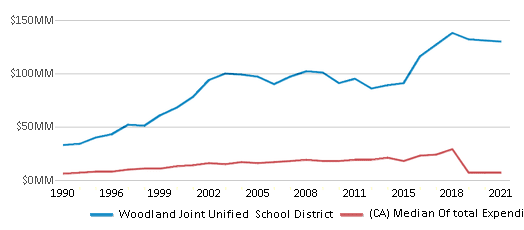
Revenue / Student
$15,802
$19,974
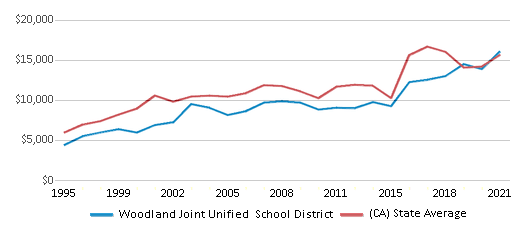
Spending / Student
$13,734
$18,396
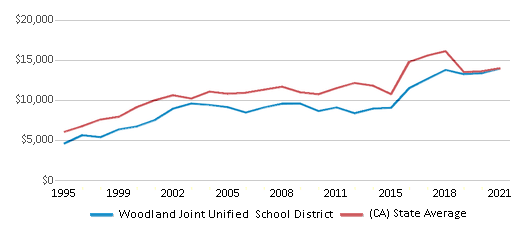
Best Woodland Joint Unified School District Public Charter Schools (2025)
School
(Math and Reading Proficiency)
(Math and Reading Proficiency)
Location
Grades
Students
Rank: #11.
Science & Technology Academy At Knights Landing
Charter School
(Math: 35-39% | Reading: 45-49%)
Rank:
Rank:
7/
Top 50%10
9544 Mill St.
Knights Landing, CA 95645
(530) 735-6435
Knights Landing, CA 95645
(530) 735-6435
Grades: K-6
| 224 students
Recent Articles

Year-Round Or Traditional Schedule?
Which is more appropriate for your child? A year-round attendance schedule or traditional schedule? We look at the pros and cons.

Why You Should Encourage Your Child to Join a Sports Team
Participating in team sports has a great many benefits for children, there is no doubt. In this article you will learn what those benefits are.

White Students are Now the Minority in U.S. Public Schools
Increasing birth rates among immigrant families from Asia and Central and South America, combined with lower birth rates among white families, means that for the first time in history, public school students in the United States are majority-minority. This shift in demographics poses difficulties for schools as they work to accommodate children of varying language abilities and socio-economic backgrounds.





